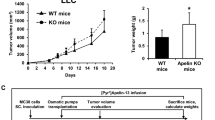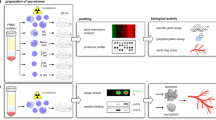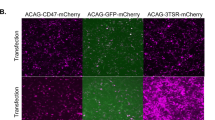Abstract
Neovascularization has a critical role in the growth and metastatic spread of tumors, and involves recruitment of circulating endothelial progenitor cells (EPCs) from bone marrow. In this study, we examined whether EPCs could promote tumor angiogenesis, and found that the tumor growth was enhanced by the administration of EPCs. To test the hypothesis that genetically modified bone marrow-derived EPCs can be effective carriers of therapeutic agents to tumor sites, we conducted human interferon-beta (HuIFN-β) gene transfection of EPCs with a virus vector in vitro. When HuIFN-β was applied in the ex vivo culture of EPCs, HuIFN-β-transduced EPCs achieved efficient killing of the total population of SPC-A1 cells, indicating a bystander effect was elicited by HuIFN-β-transduced EPCs in vitro. When SCP-A1 cancer cells were coimplanted along with ex vivo cultivated EPCs subcutaneous injection in nude mice, the tumor growth was increased. However, the anti-tumor effect of interferon-beta (IFN-β) offset the tumor-progressive character of EPCs and the tumor growth, and the vascular density of tumor tissues increased by coimplanted EPCs were decreased upon IFN-β treatment. In addition, overall expression levels of vascular endothelial growth factor in tumor tissues were decreased upon IFN-β treatment. Therefore, our results suggest that gene-transfected EPCs could be useful as a tumor-specific drug delivery system.
This is a preview of subscription content, access via your institution
Access options
Subscribe to this journal
Receive 12 print issues and online access
$259.00 per year
only $21.58 per issue
Buy this article
- Purchase on Springer Link
- Instant access to full article PDF
Prices may be subject to local taxes which are calculated during checkout






Similar content being viewed by others
Abbreviations
- IFN-β:
-
Interferon-beta
- VEGF:
-
vascular endothelial growth factor
- EPCs:
-
endothelial progenitor cells
References
Sreeramoju P, Libutti SK . Strategies for targeting tumors and tumor vasculature for cancer therapy. Adv Genet 2010; 69: 135–152.
Horsman MR, Bohn AB, Busk M . Vascular targeting therapy: potential benefit depends on tumor and host related effects. Exp Oncol 2010; 32: 143–148.
Aghi M, Chiocca EA . Contribution of bone marrow-derived cells to blood vessels in ischemic tissues and tumors. Mol Ther 2005; 12: 994–1005.
Le Ricousse-Roussanne S, Barateau V, Contreres JO, Boval B, Kraus-Berthier L, Tobelem G . Ex vivo differentiated endothelial and smooth muscle cells from human cord blood progenitors home to the angiogenic tumor vasculature. Cardiovasc Res 2004; 62: 176–184.
Gehling UM, Ergün S, Schumacher U, Wagener C, Pantel K, Otte M et al. In vitro differentiation of endothelial cells from AC133-positive progenitor cells. Blood 2000; 95: 3106–3112.
Kalka C, Masuda H, Takahashi T, Kalka-Moll WM, Silver M, Kearney M et al. Transplantation of ex vivo expanded endothelial progenitor cells for therapeutic neovascularization. Proc Natl Acad Sci USA 2000; 97: 3422–3427.
Murohara T, Ikeda H, Duan J, Shintani S, Sasaki K, Eguchi H et al. Transplanted cord blood-derived endothelial progenitor cells augment postnatal neovascularization. J Clin Invest 2000; 105: 1527–1536.
Asahara T, Takahashi T, Masuda H, Kalka C, Chen D, Iwaguro H et al. VEGF contributes to postnatal neovascularization by mobilizing bone marrow-derived endothelial progenitor cells. EMBO J 1999; 18: 3964–3972.
Willett CG, Boucher Y, di Tomaso E, Duda DG, Munn LL, Tong RT et al. Direct evidence that the VEGF-specific antibody bevacizumab has antivascular effects in human rectal cancer. Nat Med 2004; 10: 145–147.
Park HE, Baek SH, Min J, Chang YT, Kang DK, Chang SI et al. Myoseverin is a potential angiogenesis inhibitor by inhibiting endothelial cell function and endothelial progenitor cell differentiation. DNA Cell Biol 2006; 25: 514–522.
Wu X, Wakefield JK, Liu H, Xiao H, Kralovics R, Prchal JT et al. Development of a novel trans-lentiviral vector that affords predictable safety. Mol Ther 2000; 2: 47–55.
Acknowledgements
We would like to thank members of Prof Mei Ju's laboratory for their helpful discussion and critical reading of the manuscript. This work was partially supported by National Natural Science Foundation of China (30901476).
Author information
Authors and Affiliations
Corresponding authors
Ethics declarations
Competing interests
The authors declare no conflict of interest.
Rights and permissions
About this article
Cite this article
Xiao, HB., Zhou, WY., Chen, XF. et al. Interferon-β efficiently inhibited endothelial progenitor cell-induced tumor angiogenesis. Gene Ther 19, 1030–1034 (2012). https://doi.org/10.1038/gt.2011.171
Received:
Revised:
Accepted:
Published:
Issue Date:
DOI: https://doi.org/10.1038/gt.2011.171
Keywords
This article is cited by
-
Angiogenic signaling pathways and anti-angiogenic therapy for cancer
Signal Transduction and Targeted Therapy (2023)
-
Combined p19Arf and interferon-beta gene transfer enhances cell death of B16 melanoma in vitro and in vivo
Cancer Gene Therapy (2013)
-
The interferons and their receptors—distribution and regulation
Immunology & Cell Biology (2012)



